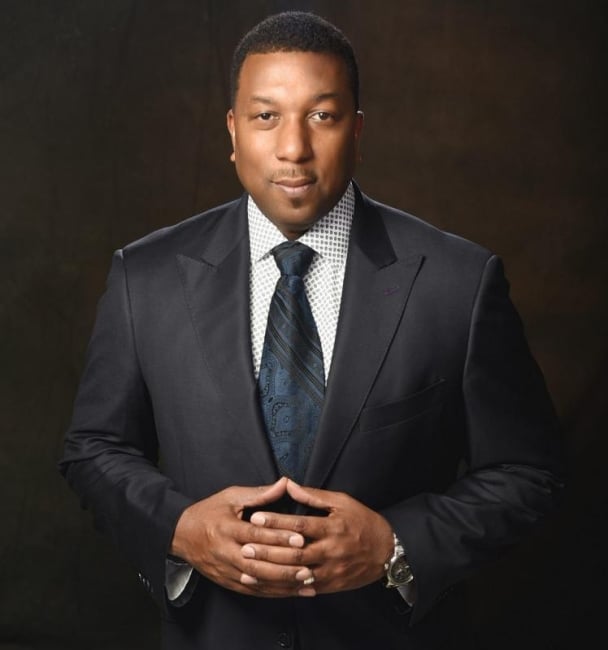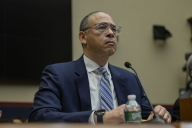You have /5 articles left.
Sign up for a free account or log in.

Darrell Allison
Courtesy of the University of North Carolina System
The blowback was swift after the University of North Carolina Board of Governors chose one of its own to be the next chancellor of Fayetteville State University.
The board's pick, Darrell Allison, resigned from the board in September to make a bid for the open chancellorship at the historically Black public university. But even before that move, Allison was a divisive figure in North Carolina higher education. He publicly supported a controversial plan to preserve Silent Sam -- a Confederate statue at the University of North Carolina at Chapel Hill's campus -- after protesters pulled it down in 2018. He has no experience in teaching or administration in higher education, and he spent much of his career advocating for K-12 charter schools. He currently serves as a vice president at the American Federation for Children, a school choice advocacy organization that has given money to conservative groups and candidates and that was once chaired by Betsy DeVos, the former education secretary.
Several people familiar with the chancellor search process told local media outlets Allison was not included in a list of finalists that was advanced to the university’s Board of Trustees and that his name was added outside of the traditional search process. Those sources allege Allison’s political connections and personal relationships with the Board of Governors ultimately secured him the chancellorship, according to NC Policy Watch, a news and commentary outlet affiliated with the progressive North Carolina Justice Center.
Fayetteville State and the UNC Board of Governors maintain Allison was appointed in line with policies created by the board for chancellor searches. Nonetheless, some vocal Fayetteville State employees and alumni see the appointment as a political move, objecting to Allison’s politics and lack of experience in higher education. Faculty members are calling on the board to rescind his appointment and redo the search. Alumni are threatening legal action.
Allison was not the first choice of anyone on the search committee, an anonymous trustee told NC Policy Watch.
“We had some very, very impressive candidates,” one trustee said, according to NC Policy Watch. “In that pool it would be difficult for anyone with [Allison’s] résumé to make the top five … even the top 10, maybe.”
A former Fayetteville State chancellor, Willis McLeod, also questioned the search process.
“To me, what's at issue is how he got the job and the fact that it doesn't appear that the process that had been outlined and published was indeed followed,” McLeod told WRAL Fayetteville.
The UNC Board of Governors oversees the entire UNC system, while individual campuses are governed by their own boards of trustees. Allison also has connections to Fayetteville State's Board of Trustees -- his mother-in-law, Brenda Timberlake, served on the board until the day before Allison was appointed, The Fayetteville Observer reported. A university spokesperson told the Observer that Timberlake did not participate in the search process.
The search for a new chancellor at Fayetteville State began in February last year, when the system's former interim president, Bill Roper, convened an 18-person search committee tasked with whittling down the number of candidates to advance finalists to the university Board of Trustees. Stuart Augustine, chair of the Fayetteville State Board of Trustees, led the committee. After the Board of Trustees reviewed the finalists, it advanced a smaller number of finalists to Peter Hans, president of the UNC system. Hans recommended a candidate to the UNC Board of Governors, which ultimately must approve the new chancellor.
A Fayetteville State spokesperson said that the search committee can recommend finalists to the university Board of Trustees but that ultimately the board chooses whom to recommend to the system president.
“While the Board of Trustees is to give consideration to the Search Committee’s recommendation, the Board of Trustees is the only body authorized to recommend finalists to the UNC System President,” Jeffery Womble, associate vice chancellor for communications at the university, wrote in an email. “Thus, the Board has the authority to recommend to the President its slate of candidates.”
Randy Ramsey, chair of the UNC Board of Governors, said the board considered the search committee's recommendations and nevertheless decided on Allison.
“The Board of Governors discussed the finalists forwarded by the campus trustees and agreed that Darrell Allison will help elevate Fayetteville State University through strong advocacy and student-centered leadership,” Ramsey said in a statement.
During a press conference Thursday, Allison said he followed the board’s procedures during the search process.
Fayetteville State faculty members and alumni have since rallied against Allison’s appointment. On Friday, the Fayetteville State Faculty Senate passed several resolutions in response to the appointment, including resolutions calling on the Board of Trustees and Board of Governors to declare a failed search, to rescind Allison’s appointment and to reinstate Peggy Valentine, the former interim chancellor at Fayetteville State, while the boards conduct a new search.
Meanwhile, the Fayetteville State national alumni association also issued a statement opposing Allison’s appointment and said that it will pursue a legal investigation into the search process. The association is also seeking legal help to delay Allison’s March 15 start date.
The university is planning meetings with alumni, faculty and staff members, students and community leaders to discuss Allison’s appointment, according to Womble, its spokesperson.
A petition against the appointment, addressed to several North Carolina lawmakers and Governor Roy Cooper, has gathered more than 2,000 signatures.
The tensions over Allison's appointment add to a recent history of political and leadership turmoil within in the UNC system. In March 2019, former East Carolina University chancellor Cecil P. Staton announced he would resign amid allegations of a long campaign at the system board level to remove him. His resignation came just months after Chapel Hill chancellor Carol Folt suddenly stepped down after she decided to remove the remains of the Silent Sam monument. Folt's resignation came as the system's president at the time, Margaret Spellings, was about to depart following a long history of run-ins with the system board. Later in 2019, a system board member whose name was often connected with much of the palace intrigue, Harry Smith, announced he was stepping down as chair.








